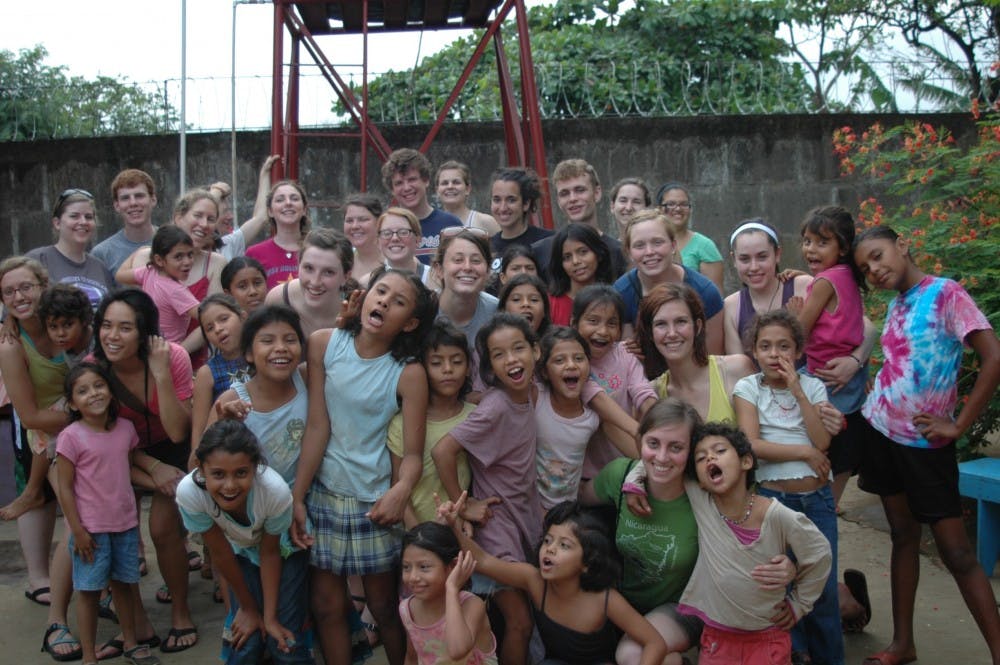Students from the 2010 Nicaragua Immersion program pose with a group of children from the Los Quinchos girls home in Nicaragua. The immersion, which took place May 7-25, worked with social issues such as fair trade, foreign policy and human rights. (Photo courtesy of Laura Goble)
By Laura Goble, Guest Commentary
Moreau Center Service-learning Trips are adventures, yes, but not vacations. They provoke soul searching, but are not retreats. Many have pointed to their participation in a trip as a profound learning experience, but not like a study abroad program.
These brief reflections from Nicaragua Immersion participants point to the six Core Commitments of Moreau Center Programs: direct-service, social justice, community, solidarity, sustainability, and reflection and spiritual exploration. These commitments are woven into the rhythm of the experience so that participants have the opportunity to end the trip as someone more in tune with their values, beliefs and convictions and equipped to live more congruently with what they've discovered.
Don't let the upcoming application due date (October 27 for Urban, Border, Alaska Plunges and Collegiate Challenge Habitat for Humanity Build) pass without considering if you might like to be challenged, inspired and maybe even transformed.
In May, 18 students traveled to Nicaragua through the Moreau Center for Service & Leadership to explore the political, cultural and economic complexities of a developing nation.
The following are excerpts from their blog which can be found at: http://nicaraguaplunge.blogspot.com
San Ramon and Seeds of Learning!
Daniel explained that the community we were going to start work in on Mon., Santa Isabel, only had a temporary wooden structure in the middle of a coffee field. The structure is extremely dark and cramped and not a dignified space in which to learn. Also, Nicaraguan law requires that the preschool be in a separate room which meant those students currently have to meet in someone's house in the community. "Seeds of Learning" works in solidarity with the people it serves by fully including them in every part of the process. Additionally, both the locals and volunteers work together to build the school, which takes longer, but it develops important relationships.
Some of us organized into groups that mixed concrete and laid bricks on the foundation which was already poured while other trucked off into the campo to get choice compacting dirt from a distant hillside. The work is tiring but the local residents have been extremely gracious hosts, including offering us freshly cooked meals to eat during breaks. Also, we all took turns socializing with the adults or playing with the children because while the school is the excuse for everyone to gather, the point is developing relationships, which is the heart of social justice.
- Theresa Cutter
Tiempo en el campo (home stays in Ramon Garcia)
My host dad, Fausto, is one of the most humble and inspiring people I have ever met. He brought us down to the river behind their house to show us the pipe that he had engineered to pump water up to their house. His gaunt face was gleaming as he showed us how it worked and how he had taught others in the community how to build one. Later that afternoon, he took us to his parcel of land, which I was not expecting to be much, because of how poor their family was... We walked through the coffee plants, he pointed out a mango tree or two, and we started walking up the hill. We walked and walked all the way up the hill, through palm, mango, and banana trees until we got to the very top with one of the most breathtaking views I had ever seen in my life! Surrounding us and the valley was a wall of mountains that were of a lush green, the tops disappearing into the clouds. We saw a rainbow off to the right, which made the scene complete. It was absolutely majestic.
We had great conversations about his time serving in the war during the revolution, their daily lives now; we shared pictures of our own families; talked about our lives in America and the struggles and problems of Nicaragua; played cards and hacky sack with the kids; and laughed. It would be difficult to physically live the way they do, but it seems like the more simply one lives, the richer their life becomes, especially when one values God, family, and community.
- Danielle Dellino
Laura Goble is the director for the Moreau Center for Service & Learning. She can be contacted at goble@up.edu
Laura Goble








